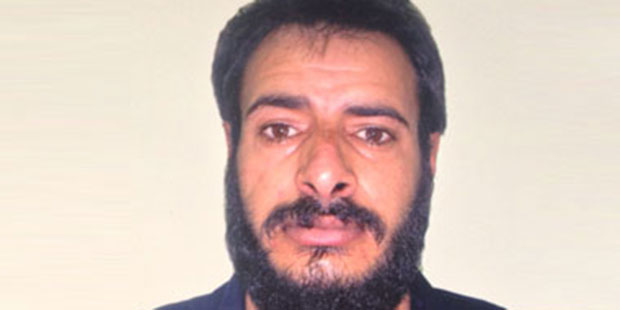 Youm7 published an intelligence report of Salama Abujrad’s confessions, one of the two Egyptians detained in an espionage case known as the Ovadia case, Thursday. He had provided Israel with sensitive information for six years and was arrested May 2013 in a security crackdown on espionage in the Sinai.
Youm7 published an intelligence report of Salama Abujrad’s confessions, one of the two Egyptians detained in an espionage case known as the Ovadia case, Thursday. He had provided Israel with sensitive information for six years and was arrested May 2013 in a security crackdown on espionage in the Sinai.
Abujrad’s trial was scheduled to begin on Wednesday at the North Sinai Criminal Court but was postponed for security reasons. He has been charged with counts of espionage and giving Israel intelligence information detrimental to national security.
Abujrad joined the Takfir and Hijra group (Excommunication and Exodus) in 2003, leading to his detainment for 17 days in 2004, then put under security surveillance. Abujrad fled to live with his sister in al-Joura village in the Sinai, where he met with a group of friends who decided to work in Israel together in January 2005.
In Israel, Abujrad worked at a carpentry workshop for eight months for 2000 shekel ($570) a month, according to the report.
Distressed by his absence, Abujrad’s mother threatened his friends that she would report their implication in smuggling weapons, drugs, and African immigrants through the tunnels along the Sinai border strip. His friends contacted him and he returned by the end of 2005.
Back in the deteriorating economic conditions in the Sinai, Abujrad expressed his wish to work in Israel again. Mohamed Abu Eyada, also known as Mohamed al-Khomeini, called his relative living in Israel, Omar Harb, to help them find work in Israel again. Harb offered them work with the Israeli intelligence, Mossad, and they accepted.
According to the intelligence report, Omar Harb, a descendant of one of the largest Sinai tribes, has lived in Israel for 32 years. He was sentenced to death in an espionage case in Egypt in 1990 alongside Abu Abdullah, a descendant of the Sinai tribe al-Azazma who also lives in Israel. The two have been implicated in espionage operations for recruiting Bedouin youth and presenting them to the Israeli intelligence after enticing them with fast, profitable gains.
The report said that Abu Abdullah is almost in full control of the border strip- that no one infiltrates through the borders without his knowledge, and if the Israeli intelligence asks, he arranges for specific people to cross the borders. He arranged for Abujrad to cross the borders three times, once in 2005, and twice after that to meet with Israeli intelligence officers, the report said.
Actual contact between Abujrad and the Israeli intelligence officer Shalomo Sofer began in February 2007.
In 2008 and 2009, Salama Abujrad gave the Israeli intelligence critical information on the stationing of Egyptian Armed Forces personnel in Rafah and Sinai and on the headquarters of security services and intelligence in Arish and Rafah. He also provided his Israeli partners with detailed information on people working in arms trafficking, factories, and Arish Stadium.
The Israeli intelligence used Abujrad to locate “elements dangerous to the Israeli security.” He made a call from his Israeli cell phone at the house of a Bedouin named Abdel Rahman Ayed and provided detailed information on several jihadists wanted by Israel.
From 2007 to 2012, Abujrad worked in this espionage network alone, until he met Tileb Owda in September 2012 and started to collaborate. They crossed the borders into Israel twice, spent four days with the Israeli military intelligence in Beersheba, where they met with the intelligence officers Danny Ovadia, Aaron Danoun, and David Yacoub, and received $2,500 each. The three officers, including Israeli Sholom Ofer, are being tried in absentia in the espionage case.
The two spies provided detailed reports on the security conditions. and in time, their work expanded to include the neighboring Ismailia governorate and Salhiya city in Sharqia governorate, where they took pictures and filmed videos of missiles smuggled from Gaza Strip to be sold to arm dealers.
In October 2012, the Egyptian intelligence received information that Abujrad and Owda were seen the same month with Danoun and Yacoub in the Israeli city of Ashkelon. Since then, the two men were put under close surveillance.
When the Egyptian security services arrested Owda Ibrahim in April 2013, Abujrad called Sofer and asked for help to cross the border into Israel. He tried to reach the Israeli officer again, but he did not answer his calls. Abujrad called the landline number of the Israeli intelligence and asked to speak with the officers he knew, but he was told it was not the intelligence office.
Security services located Abujrad and arrested him in a security crackdown shortly thereafter, ending his six-year stint spying for Israel. Abujrad’s phone had 115 Israeli numbers of intelligence officers, human traffickers, arms and drug smugglers, and wanted spies.
The report mentioned that Abujrad was an eyewitness to the attack on an Egyptian military base in Sinai which claimed the lives of 16 Egyptian soldiers on Aug. 5, 2012.
Abujrad said that once he heard the shooting, he called the commander of the boarder intelligence in Arish and an ambulance, adding that he also helped paramedics in transferring the victims.



